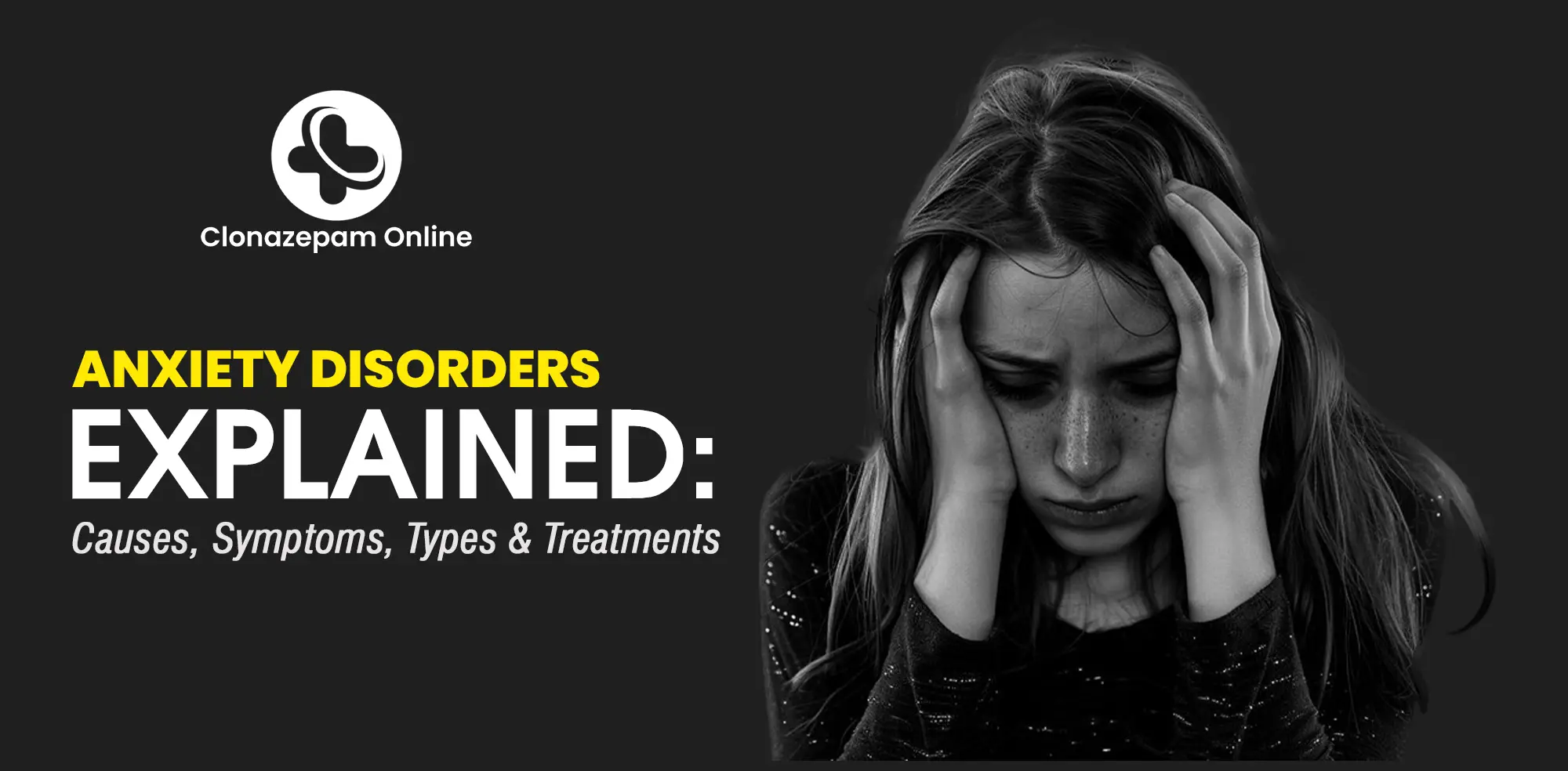Subtotal: $318.00

Feeling overwhelmed, restless, or constantly worried? You’re not alone. One of the most prevalent mental health issues in the world today is anxiety disorder, as now the treatment for anxiety is available with a great success rate. This article will examine the anxiety disorder symptoms, causes, forms, and treatment options.
Before going to the meaning of Anxiety disorder, let me tell you that in the US, anxiety affects 40 million adults annually. According to the 2025 referendum, anxiety affects 1 in 3 Americans. The reason behind the increment of anxiety is job security over career growth.
On the other hand, some people have anxiety or panic attacks for no apparent reason or have them for a variety of reasons, including a location or circumstance, a fear of a potentially harmful object, or the immediate consequences of a traumatic event. If you want to get treated medically, then you can buy Clonazepam online, as it is the best medication for panic attacks and anxiety.
It is marked by intense emotions of fear or concern that get in the way of day-to-day activity. Symptoms include restlessness, difficulty putting worries aside, and excessive stress due to the circumstances. Counseling or medication to assist in managing the symptoms is part of the treatment. Anxiety disorders include obsessive-compulsive disorder, post-traumatic stress disorder, and panic attacks.
Everyday anxiety is common since many people worry about their jobs, health, finances, education, or families. It is natural and does not harm health. Clinical anxiety, however, encompasses more than occasional worry or panic. Even though anxiety worsens over time, it does not go away quickly for those who have this illness and is felt in various scenarios. Therefore, seeking better treatment as soon as possible and consulting a doctor or healthcare practitioner is preferable.
Why do people have anxiety? This disorder does not come from birth; the causes of anxiety happen due to various reasons, which are mentioned below:
Biological families are often affected by anxiety problems. This implies that genetics might be involved. People who suffer from generalized anxiety disorder may have a history of significant life changes and traumatic or unpleasant childhood experiences.
Your chance of having anxiety may be increased by recent or past stressful experiences, such as being abused or serving in battle. Although stress is a common occurrence for everyone, severe or unresolved stress might raise your risk of developing persistent anxiety.
It is how your brain responds to stress and warns you of impending danger. A recent event, traumatic or unpleasant childhood events, or a history of major life upheavals can all be contributing factors to generalized anxiety disorder.
Clonazepam improves early treatment satisfaction by offering prompt alleviation, which can enhance adherence to long-term therapy, such as psychotherapy and antidepressants.
Your chance of developing an anxiety disorder is increased if you suffer from certain mental health problems, such as depression.
Most often, people feel overly worried or fearful. It may make it difficult to focus and fall asleep. It can cause several symptoms here are some common symptoms of anxiety:
Learning about anxiety, mindfulness, relaxation techniques, proper breathing techniques, dietary changes, exercise, assertiveness training, self-esteem building, cognitive therapy, exposure therapy, structured problem-solving, medication, and support groups are some strategies for managing it. But for the treatment, it is preferred to consult the healthcare provider and with a valid prescription, you can buy Clonazepam online.
The following lists the most common forms of anxiety:
A form of anxiety illness known as agoraphobia causes you to fear and frequently avoid situations or locations that could make you feel helpless, embarrassed, or confined. You can order clonazepam online for the treatment of it under doctor's guidelines with a valid prescription.
Symptoms of severe anxiety or panic that are directly brought on by a physical health issue are included in anxiety disorder caused by a medical conditiIt includes excessive, concern and anxiety about everything. The worry impacts your physical well-being, is hard to regulate, and is excessive for the situation. It frequently coexists with anxiety or other depression disorders.
Frequent, severe experiences of dread, worry, and fear that peak in a matter of minutes are the hallmarks of panic disorder. You might have chest pain, shortness of breath, or a hammering heart. These panic attacks might cause people to avoid settings where they have happened or worry that they will happen again.
Children consistently struggle to talk in some settings, like school, even though they can do so in other settings, including with close family members at home. Professional, social, and educational functioning may be hampered by this.
Anxiety that is excessive for the child's developmental stage and associated with separation from parents or other adults who play a parental role is the hallmark of this childhood disease.
It is characterized by extreme anxiety, fear, and social scenario avoidance brought on by emotions of shame, self-consciousness, and worry about being scrutinized or perceived adversely by others.
These are typified by a strong desire to avoid a certain circumstance or object and significant anxiety when exposed to it. Some people experience panic attacks as a result of phobias.
It is typified by severe anxiety or panic symptoms that are brought on by drug abuse, prescription side effects, exposure to toxins, or drug withdrawal.